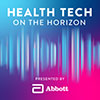
Available in latest versions of Chrome, Safari, Firefox and I.E. 11.12+
 | Listen, download and subscribe to our podcast channel: |
The science of medicine has always been the science of decision-making. From medieval barbers trying to optimize the bloodletting required to “cure” their patients to early surgeons determining initial incision sites through to today, healthcare providers have always focused on obtaining the best available data to inform their patients’ options.
In the latest episode of our podcast series, “Health Tech on the Horizon: Diabetes,” host Mike Rugnetta talks with John Nosta, technology theorist and founder of the digital health think tank, Nosta Lab, and Laura Brandner, Director of Real World Evidence Programs, Abbott Diabetes Care, about the importance of scientific information and subsequent medical decisions.
A particularly important data point concerns the prevalence of diabetes which has risen steadily from 108 million to more than 420 million globally from 1980-2014.
The coronavirus pandemic has also brought on a new level of risk for people with diabetes. According to the U.S. Centers for Disease Control, more than 50% of people diagnosed with both COVID-19 and diabetes have been hospitalized, a rate far higher than with other people carrying the virus.
Power of Evolution
In addition to the implications of those statistics, the podcast panel also discusses the scientific evolution of continuous glucose monitoring (CGM) and its impact on living with diabetes. While fingertip testing provides a broad picture of ongoing glucose management, monitors like the FreeStyle Libre system can provide ongoing information when it is needed most.
Enhanced monitoring data, integrated with other wearable technology, may eventually lead to more individualized care that constantly adjusts for each person.
As this fascinating panel discusses, the importance of enhanced data in improving medical decision-making and evolving technology may take much of the guesswork out of people's daily lives.
IMPORTANT SAFETY INFORMATION
The FreeStyle Libre Flash Glucose Monitoring system is a continuous glucose monitoring (CGM) device indicated for replacing blood glucose testing and detecting trends and tracking patterns aiding in the detection of episodes of hyperglycemia and hypoglycemia, facilitating both acute and long-term therapy adjustments in persons (age 18 and older) with diabetes. The system is intended for single patient use and requires a prescription.
CONTRAINDICATIONS: Remove the sensor before MRI, CT scan, X-ray, or diathermy treatment.
WARNINGS/LIMITATIONS: Do not ignore symptoms that may be due to low or high blood glucose, hypoglycemic unawareness, or dehydration. Check sensor glucose readings with a blood glucose meter when Check Blood Glucose symbol appears, when symptoms do not match system readings, or when readings are suspected to be inaccurate. The FreeStyle Libre system does not have alarms unless the sensor is scanned, and the system contains small parts that may be dangerous if swallowed. The FreeStyle Libre system is not approved for pregnant women, persons on dialysis, or critically-ill population. Sensor placement is not approved for sites other than the back of the arm and standard precautions for transmission of blood borne pathogens should be taken. The built-in blood glucose meter is not for use on dehydrated, hypotensive, in shock, hyperglycemic-hyperosmolar state, with or without ketosis, neonates, critically-ill patients, or for diagnosis or screening of diabetes. Review all product information before use or contact Abbott Toll Free (855-632-8658) or visit www.freestylelibre.us for detailed indications for use and safety information.
Please be aware that the website you have requested is intended for the residents of a particular country or region, as noted on that site. As a result, the site may contain information on pharmaceuticals, medical devices and other products or uses of those products that are not approved in other countries or regions.
The website you have requested also may not be optimized for your specific screen size.
Share